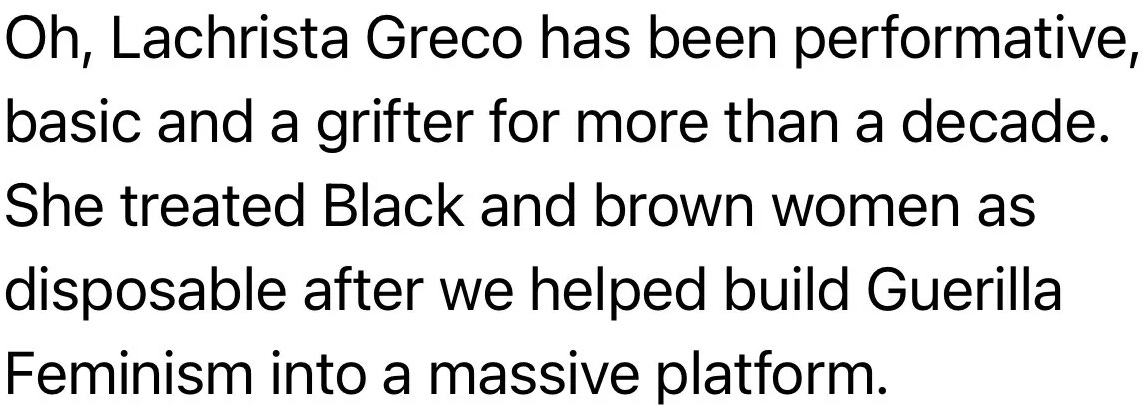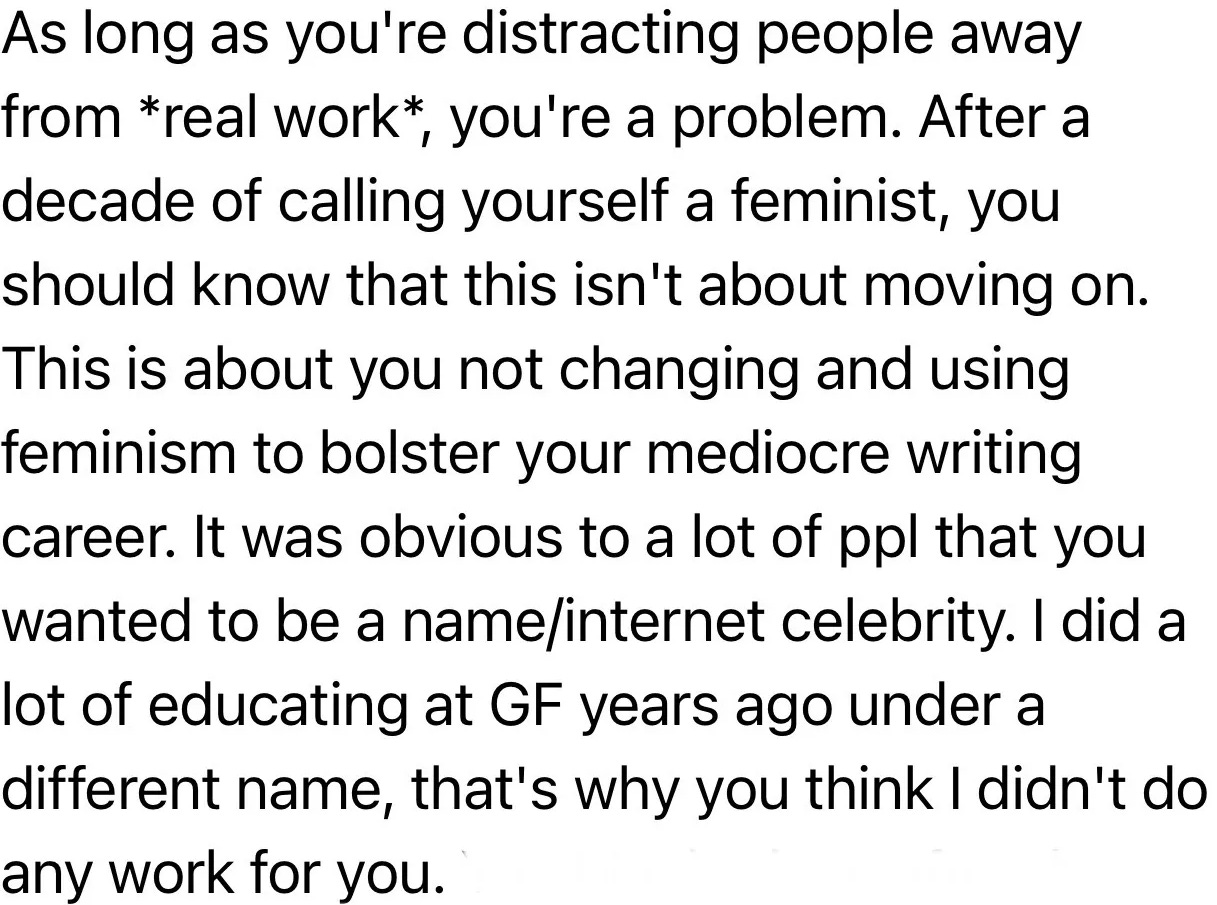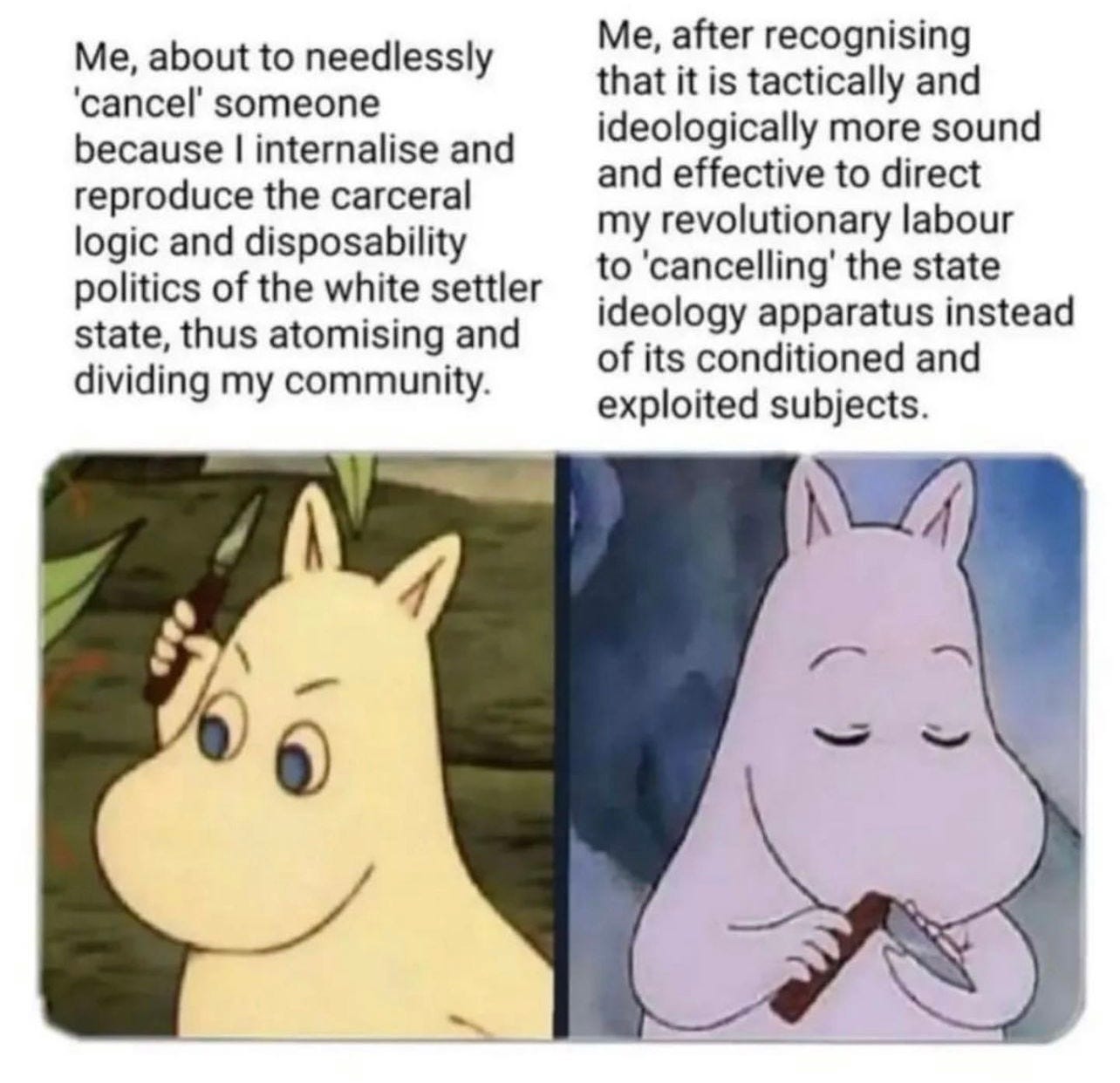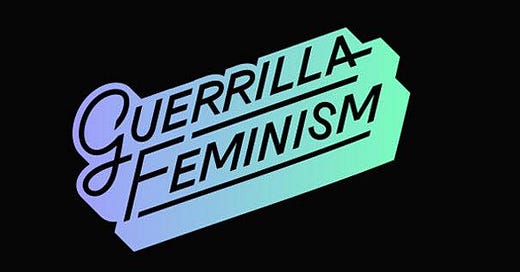Guerrilla Feminism: Notes on a Movement
Some people will forever be committed to hating the warped version of me that they created
Rage & Softness is reader-supported! Thank you to the folks who pay monthly to support my work. If you want to upgrade to paid, go here.
Add your favorite song to the newsletter Playlist!
Please “heart” or share my writing with your community and comrades! Forward this email to a friend, put it in your own newsletter, screenshot and share it on social media.
If you would like to pay for a subscription, but don’t want to do so through Substack, you can pay via my Venmo or PayPal. Also, if you’d like a paid subscription, but can’t afford it, please email me and I’ll add you—no questions asked.

Because it came up yet again, I feel the desire, no, urge, to write about it. To continue to try to set the record straight. To make people believe me. To tell people what actually happened. And yet, some people will forever be committed to hating the warped version of me that they created.
This is the last time I’m going to talk about this.
The image from above was posted on Threads under another creator’s account this past week. I saw it and got immediately defensive because of it’s falsity and because this shit has followed me since 2015. At this point, I have over-explained myself. I know some will tell me to ignore it. I sometimes have done that, but I don’t like feeling silenced by rumors.
In my decade-plus time participating in digital feminist activism on social media, I have been called-out, ostracized, and told to “take accountability” more times than I can remember. I took accountability for various missteps in front of hundreds of thousands of people. Some instances were valid. Some instances were completely fabricated.
I was a hardcore bitch most of this time. I was angry about a lot of things with no where to put it.
For those who don’t the history: I created this thing called “Guerrilla Feminism” in 2011. It got big really quick on Facebook. I enlisted the help of my friends Cortney and Audrey to flyer around Chicago. Then people online wanted to take part and either help with the main page or create their own branch pages. I met a lot of cool people on the internet.
Suddenly, I was thrust into a leadership role managing 50 volunteers and overseeing their pages while having a full-time 9-5 job. I had a “core” team of people I knew IRL and people I only knew from the internet. Our small team was majority women of color. It was important to me that there was consistency in what was posted on all branch pages (in terms of our ideals). I didn’t want anything transphobic posted. Nothing whorephobic. People needed to be on the same page about this. I’m sure this came off as controlling. I’m sure I was controlling. GF was my baby and I wanted nothing but the best for my baby.
In 2015, Guerrilla Feminism was briefly a nonprofit. Mostly because a white guy who inherited a bunch of money decided he wanted to give 10K to GF. Making it a nonprofit was a lot of work and I was doing most of it. I also had a full-time job. Eventually, there was a kerfuffle. We had a board of directors (four of us to be exact), and the Secretary (a Black woman), another GF volunteer (a white woman), and myself (white woman) were discussing ways to fundraise for the organization. The three of us met virtually with a white man who the GF volunteer knew personally. He was overpromising that if we put on a gender studies conference, we could make some money from it. I knew this was 1) complete bullshit (putting on a conference will expend more money than bring it in--especially for baby orgs), and 2) it was not worth what this man was asking of us.
The meeting was tense, and it became more so when he said it wasn’t a “good look” that one of the few trans women of color volunteers was “so” open about her suicidal ideation on the GF Facebook page (side note: this person has since died by suicide, rip XK). I lost my cool at this moment. I started crying. I abruptly left the meeting. I closed my laptop. I was angry. Was this the best way to handle it? No, probably not. But how dare this white man tell me that a trans woman of color on my team shouldn’t talk about her suicidal ideation because it might make people uncomfortable! I came back to the meeting, and said: “No, we’re not doing this. I’m not comfortable with this.” I was shocked and surprised that the GF Secretary and the GF volunteer saw no issue with what this man was saying. Later, I received an email from the GF Secretary saying she was resigning. She accused me of turning down “a huge amount of money” (there was never any money) for my own self-interest. She then spent the next few years consistently spreading lies, rumors, and general vitriol about me. She claimed I never paid her for the writing she did for the long-dead GF website (I did pay her--I have PayPal receipts). I have even posted screenshots of these payments, however, it has her government name on them (which I blotted out), so no one believed me. She also allotted an entire podcast episode to how terrible I was, and compared me to Rachel Dolezal, which, frankly, I’m still confused by since I never once pretended to be someone or something I wasn’t. Perhaps most egregious, she outed me as a former sex worker--something I’m not ashamed of, but something I wasn’t very open about at the time for various reasons. These two women created a smear campaign so severe that I contemplated suicide. I still struggle with paranoia and PTSD from this experience. I’m sure they find this hilarious. Onlookers impulsively believed GF’s former Secretary, and I know a big part of that was because of race. I’m a white woman and she’s a Black woman. People believed the other GF volunteer (who was white) because she aligned herself with the Black woman.

Before this, I, too, recklessly believed anything a more marginalized person said in the social justice realm of the internet. It’s generally a good rule of thumb, especially for people of color, to not believe white people. There is a tremendous amount of pain and trauma around the many, many, many lies that white people--specifically white women--have told and continue to tell. I have never (and would never) fault a Black person or person of color for not believing white people, and I would never tell them what to do or what not to do. I do, however, have concerns around the idea that we should just “believe” the most marginalized person in any given situation. This is an ongoing issue in social justice spaces, specifically. As Kai Cheng Thom writes,
I find that social justice or leftist communities also tend to misapply social analysis to individual situations of abuse, suggesting that individuals who belong to oppressed or marginalized groups can never abuse individuals who belong to privileged groups (that is, that women can never abuse men, radicalized people can never abuse white people, and so on). But neither of the above ideas is true. Survivors of abuse in one relationship can, in fact, be abusive in other relationships. And it's easier for privileged individuals to abuse others because of the extra power social privilege gives them, but anyone is capable of abusing alone given the right (or rather, wrong) circumstances.
I do not necessarily believe my experience constitutes abuse, but I think the point still stands when in conflict with others.
I have been lambasted for blocking women of color from my page (even when I didn’t know their race). I have been called out for acting “defensive” when my literal character was under attack. I am considered completely undeserving of anything good because I have a big following on Instagram (even though I built that account up and Instagram is dying out anyways).
I also have concerns about white people thinking that their “activism” is to act as attack dogs on behalf of people of color--especially when people of color have never asked for this from white people (and it generally seems to further harm people of color, and create more labor for them anyways). The white person doing the attacking is essentially shunning and ostracizing the other white person, which only means the white person being called-out will not learn anything. Thus, the white person being called-out will inevitably continue to harm people of color. White people need to spend time talking to and educating each other.

What I experienced completely changed how I think about call-outs. It’s unfortunate that, until it happened to me, I, too, relished in that attack dog digital “activist” life. I spent a lot of time yelling at people online, engaging in cross-platform harassment, and using my large following to humiliate and shame others. At the time, I remember thinking: “I’m not like them. I’m better than them.” But that’s not true. And that’s what most white people won’t admit. Many white people act like this online as a way to distract from themselves and their own failings. If you’re constantly pointing the finger at others, then no one will look at you (including yourself). Harassing someone online and saying it’s a “call-out,” does a disservice to call-outs, and of course, to the humanization of all of us.
Guerrilla Feminism, and by extension me, was shitty in a lot of ways. We were elitist. We were always saying things like, “We don’t do Feminism 101 here.” We thought we were better than every other feminist page out there. People’s egos, including my own, often got in the way of anything substantive we were trying to do.
When I devoured Kathleen Hanna’s memoir last weekend and read what she said about the Riot Grrrl movement, I felt such kinship. I’m not saying that GF was ever as big as Riot Grrrl, but we had the same problems. In the book, Hanna talks about retreating from the movement and one woman in particular who kept harassing her about how problematic [Hanna] she was. I knew GF was bigger than me, but it was also something I created, something I poured my blood, sweat and tears into. Eventually, I shut it down and I asked all the pages to shut down or change their name. Was that fair to them? Maybe not. But by that time, I just wanted to hide from the world and didn’t want my name attached to anything other people were doing. I also didn’t want people who were committed to hating me and misunderstanding me to take something I had created.
As a neurodivergent person, I’m always terrified of being misunderstood. I’m always worried that I’m not articulating myself how I mean to.
I am not the same person I was 10 years ago and thank god. I have learned, grown, read a lot, done a lot of therapy, and continue to do all of these things. People who know me (like, really fucking know me) see that I’m always working on myself. I am a better, kinder, softer person than I was then. Still, I was not nearly as terrible as some people claim.
I will never be able to convince people to see my side of things. Even if what a small sect of people said about me was true, I could do all the penance in the world and they would not be happy until I’m dead (or, at the very least, not online).
Knowing this doesn’t feel great, but I continue to do my “mediocre” writing (which, by the way, feels like breathing to me so I’ll never stop), and I continue to share about Palestine and various atrocities, and I continue to post silly little memes.
Carceral feminism will not free us. There is room for all of us.
There is no “Red Line”:The tent massacre and what comes next. -
This interview with Julia Cameron was lovely to watch -
Life As an Abortion Doula - Meagan Jordan
How to make spaces more accessible during the continuing pandemic - Emily Dupree & Shelby Seier
What we learned from UW-Madison’s pro-Palestine encampment - Christina Lieffring and Emily Mills
Disinformation Vector (and Are Severely Undercounting the Problem) - Emanuel Maiberg
“We Need A Digital #MeToo”: The Filmmaker & Activist Fighting The Rise Of Deepfake Abuse - Jamison Kent
New York prisons are illegally subjecting disabled people to solitary confinement - Elly Belle
Climate-Displaced Communities Demand Justice During International Court Hearings - Jessica Corbett











I had no idea that you'd been through all of this and there's so much that I sadly relate to in what you've shared here. It has been a long and hard road for me to accept that others have crafted a story of me that is so wildly untrue and that I can do little to nothing to change. Sending so much love and solidarity 🫂
Thank you for sharing this. It reminds me of what is happening to Ijeoma Oluo surrounding her latest book. Sending you much appreciation and solidarity.